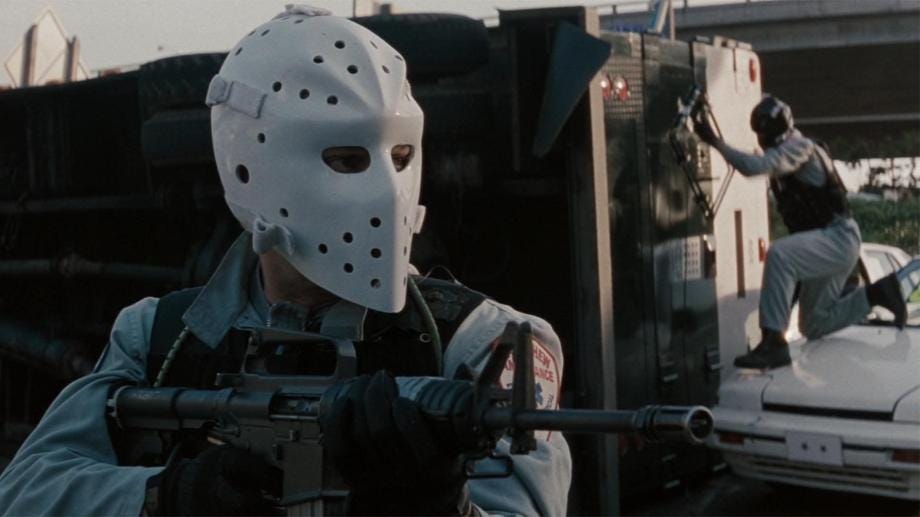“Heat”
1995 • R • 2hs 50mins • Rent on iTunes / Apple TV
We’ve been stuck under the heat dome for two week. But tonight, we’re not letting ourselves get attached to anything we’re not willing to walk out on in 30 seconds flat if we feel the heat around the corner. It’s Michael Mann’s ’95 crime landmark, Heat.
Here’s the plot. We’re in LA with Neil McCauley (Robert De Niro), pro heist guy. His crew consists of Chris (Val Kilmer), Michael (Tom Sizemore), Trejo (Danny Trejo) and new guy Waingro. They rob an armored truck, clockwork planning on full display. Hothead Waingro kills one guard, leading to the deaths of the other guards. The crew get away clean. LAPD’s Vincent Hanna (Al Pacino), Drucker (Mikelti Williamson) and Bosko (Ted Levine, basically auditioning for Captain Stottlemeyer) arrive on the scene, professionally crushing on how good a job the bad guys did. With Hanna on McCauley’s trail, the next job robbing diamond drill bits doesn’t work out. Soon, McCauley’s on Hanna’s trail too. The two crime GOATs meet for coffee, laying out their inability to do anything else. They’re locked in these roles, having repeatedly thrown away their respective keys. Hanna’s only happy chasing bad guys. McCauley’s miserable going after the score that’ll let him walk away for good. As McCauley’s crew does One Last Job, we’re wondering: Will the bad guys get away? Can we cheer for the good guys too? How much does a duffle bag stuffed with millions weigh anyway?
So many plot threads. It’s like The Wire Lite. Why is so much happening? Because Mann first wrote this script for a TV show that didn’t get picked up. The pilot turned into the ’89 TV movie L.A. Takedown. Mann came back to it in ’94, reincarnating it as a true film. It’s been called the only movie he made twice. On top of Mann’s singular talent for this genre, that backstory explains why Heat is so much better than it has to be. Even toss-away moments hold up to scrutiny, like how McCauley and company move on the bank in part because they owe the guy they got the scoop from six figures. It would mess up everyone’s retirement plans to walk away. And why barely important characters like Dennis Haysbert’s wheelman get a whole motivation setup. It fits the central thesis that the world is stacked against any of these folks choosing not to re-up the roles society stuck them in.
The gunshots are so loud. You notice it from the first heist. All filming was on location in LA, which Mann said he didn’t get why more movies didn’t do. The city itself is the set. The sound of machine gun shots was recorded there too, the echoes cracking off real LA concrete and blacktop. It makes a difference. It’s not cool, it’s scary. Like violence actually is.
A few make it out. Hanna makes a big call in a small moment near the end. He says no to chasing the bad guy. Yes to staying with family. Justine lets him go, but it’s within their first egalitarian dialogue. They part caring about each other. It’s an evolutionary leap. Even if their marriage ends, we get the sense they’ll stay friends. I wonder if thematically Hanna’s newfound ability to change is the reason for who comes out on top in the final showdown.
Change anything and you have a different movie. You want a more clever robbery? Inside Man. The comic book version of this? The Dark Knight. The version where we love the bad guys? Ocean’s Eleven (or Thirteen, with Pacino himself). More getaways? Baby Driver. More chins? The Town. More Statham? Wrath of Man.
Mann’s script is none of those. Heat doesn’t think the bad guys are cool geniuses. They’re just people who only do this. It doesn’t think they’re invincible—just check the bodycount by the end. So what’s the deal? The secret sauce is sympathy. Toward the good guys. The bad guys. Everyone in their lives stuck high and dry. They make realistic decision with dramatic but believable consequences. Heat played on cable all the time when I was a kid. It’s better than that. I know, because the best crime capers for twenty years after stole from it.
NOTES
The soundtrack never develops into a theme. It’s unsettling, atmospheric. Composer Elliot Goldenthal created what he called a “guitar orchestra” to achieve an atmospheric sound with European flair. Deserves a Best Original Score Oscar just for inventing the term “guitar orchestra”.
Tom Sizemore (Saving Private Ryan) battled substance addition for many years. In ’13, De Niro himself checked Sizemore into rehab. It’s good to know there are real friends in the movie business.
This is one of those movies where you realize as a grownup that many of the characters are on drugs the whole time.
Kilmer’s dead eyes and yucky ponytail haunt me.
Nathalie Portman made this the year after Leon: The Professional. I’m glad she got out of roles like this. Seems like it would take a toll on a person.
Waingro is a problem since the beginning. He’s the devil. A chaotic bad. How nuts is it that he’s part of a serial killer D-plot? Ted Levine was offered this role and smartly turned it down, not wanting to be stuck in Silence of the Lambs typecasting.
Because of the running time, this came out on two VHS tapes before its DVD release in 1999.
A lot of Heat is based on a true story.








